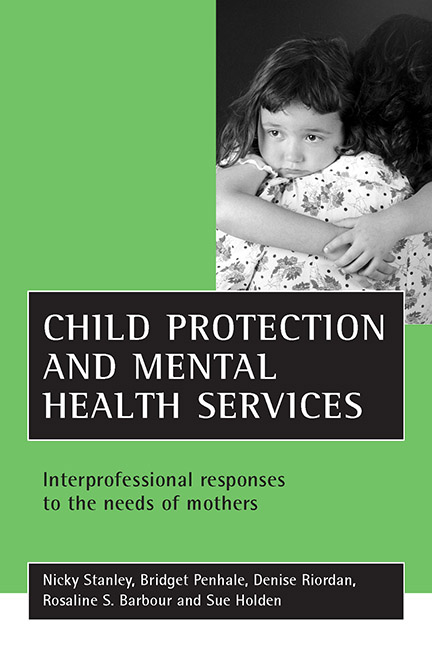Book contents
- Frontmatter
- Contents
- List of tables and figures
- Introduction
- one Mental health needs and mothering
- two The service context
- three Interprofessional work
- four The research study
- five Identifying key research issues
- six Mothers’ perspectives
- seven The mothers’ evaluations of professional support
- eight The professionals and their practice
- nine Conceptualising needs and evaluating risk
- ten Interprofessional communication and coordination
- eleven Identifying appropriate resources
- twelve Conclusion
- References
- Index
- Also available from The Policy Press
twelve - Conclusion
Published online by Cambridge University Press: 20 January 2022
- Frontmatter
- Contents
- List of tables and figures
- Introduction
- one Mental health needs and mothering
- two The service context
- three Interprofessional work
- four The research study
- five Identifying key research issues
- six Mothers’ perspectives
- seven The mothers’ evaluations of professional support
- eight The professionals and their practice
- nine Conceptualising needs and evaluating risk
- ten Interprofessional communication and coordination
- eleven Identifying appropriate resources
- twelve Conclusion
- References
- Index
- Also available from The Policy Press
Summary
This final chapter draws together the key themes of our research and develops some recommendations for policy and practice. The study findings have relevance for transactions between practitioners and users as well as for the relationships between different groups of professionals and their organisations. Our proposal for a dyad of keyworkers in cases where mothers have mental health problems and where there are child protection issues is designed to impact on each of these interfaces. However, some of the problems identified for mothers with mental health problems are not only confined to how professional roles are defined and played out, but also concern the availability and distribution of resources. Access to resources is increasingly determined at a national level, although new initiatives still tend to have local beginnings. Therefore, the messages here are directed at policy makers at all levels as well as at the full range of practitioners in statutory and voluntary settings.
The centrality of trust
The interviews with mothers highlighted their capacity to distinguish clearly between different professionals and their primary responsibilities. Mothers were aware that child care social workers’ predominant task was the protection of children's welfare. They resented the scrutiny of their parenting by child care social workers and experienced child protection case conferences, supervised contact and other formal processes as threatening and disempowering. Such accounts are consonant with the evidence of other research studies (Cleaver and Freeman, 1995; Farmer and Owen, 1995) that have explored families’ perspectives on the child protection process. However, for mothers with mental health problems, the alienation and powerlessness experienced in relation to the child protection system are likely to exacerbate existing feelings of low self-esteem, loss of control and stigma.
The women in this study also criticised child care social workers’ lack of availability and the attitudes they displayed towards service users. Such comments may in part be a response to the statutory role of child care social workers with its implicit threat of coercion; however, they also reflect child care social workers’ limited opportunities for the exercise of interpersonal and counselling skills in the job. These restrictions can be attributed to a combination of limited resources and an emphasis on a bureaucratic, care management model of practice that prioritises assessment and the construction of care packages over therapeutic interactions with service users.
- Type
- Chapter
- Information
- Child Protection and Mental Health ServicesInterprofessional Responses to the Needs of Mothers, pp. 113 - 122Publisher: Bristol University PressPrint publication year: 2003



